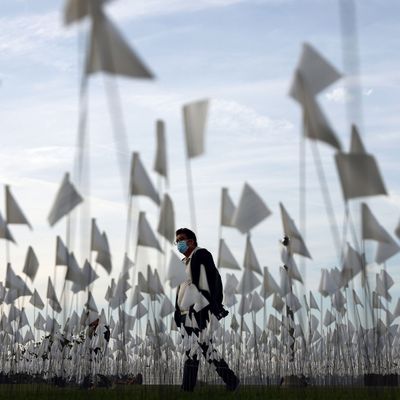
I am sick. Not with COVID, but with a cold that unsettles me the longer it lingers. What a strange time to be sick with anything at all. To feel ill, now, is to be in sync with misery beyond your own person. The whole country is sick, with Omicron, with fear, with hate. We move toward something new, something terrible. “I don’t mean to deny COVID’s continuing presence,” wrote Matthew Walther in The Atlantic, a load-bearing sentence. “What I wish to convey is that the virus simply does not factor into my calculations or those of my neighbors, who have been forgoing masks, tests (unless work imposes them, in which case they are shrugged off as the usual BS from human resources), and other tangible markers of COVID-19’s existence for months — perhaps even longer.” Eight hundred thousand people are dead, more will die soon, and Walther, a devout Catholic, says nothing of grief. Such nihilism invites a question: Will God forgive us?
That same question animates First Reformed, Paul Schrader’s masterful 2018 film. It appears, first, in the mouth of a man about to take his own life, who asks it of the pastor of a dwindling church. The question haunts Toller. Chased by death, tormented by a world in decline, Schrader’s cleric, Ernst Toller (Ethan Hawke), cannot contain his despair. It spills outside him, where it acquires its own velocity. On the sign in front of his church, Toller asks the same question, this time of anyone who might pass by: Will God forgive us? Climate change is the terror stalking Toller, but COVID feels almost as large. I want to ask my own question: Can we forgive ourselves?
Walther finds it easy. “In 2020, I took part in two weddings, traveled extensively, took family vacations with my children, spent hundreds of hours in bars and restaurants, all without wearing a mask,” he boasts. While Walther celebrated, maskless, mobile morgue trucks appeared in my city. I rescheduled my own wedding and marked the death of my grandfather at an outdoor service far smaller than he deserved. Others lost even more. Children were orphaned, spouses widowed, siblings lost. More survived the virus than died, only to live with the aftereffects for months, even years. Pain leaves a mark, sparing none of us.
It’s true enough that much of the country has decided to pretend that nothing is wrong at all. True, too, that winter 2021 is not spring 2020. For the fully vaccinated, the virus is not a major threat. I held my own wedding this fall after rescheduling it twice. Yet there are those among us, including the elderly and the immunocompromised, for whom Omicron poses greater risk. Even the unvaccinated deserve compassion. To deny them this is to surrender to Walther’s nihilism.
Yet nihilism has its temptations. Walther’s existence sounds easier than my own, and I envy him for that, a little. It’s easier to shrug at the way things are than it is to do anything about it. “Well, somebody has to do something! It’s the Earth that hangs in the balance,” Toller tells a fellow man of God. “What if this is his plan? What if we just can’t see it?” the other pastor says. God destroyed the Earth before, he reminds Toller; raining death for 40 days and 40 nights. In the Bible, of course, God spares a holy remnant, and the Earth is reborn, seeded with new life. The lesson isn’t applicable to either climate change or COVID. Climate change will come for all of us. The virus, meanwhile, spares a remnant, but their survival has nothing to do with holiness, and the fate that awaits us all hasn’t yet taken shape. It could be life. It could be more death. We must choose.
Right now, that choice feels almost predetermined. The winter will be long, and it’s a difficult moment to believe that radical social change is not only necessary but possible. Those in power do not seem to agree. The Biden administration has little to show for its time and appears determined to disappoint the masses it urged to vote in 2020. The White House has said it won’t distribute free at-home tests, allegedly because of the cost, even though tests are expensive and often difficult to find. Elsewhere, the administration offers few other reasons to feel optimistic at all. Student loan payments are about to restart. The child tax credit that helped so many is about to expire. Attorneys for the administration have left talks over how to compensate the victims of Trump’s family separation policy at the border. Democrats in the Senate will reportedly delay the president’s spending agenda to focus on voting rights, another cause that will almost certainly fail because of two conservative Democrats there. On climate change, they’ve done nothing at all. Nihilism is everywhere.
Even in winter, there’s still hope. Our illness is not terminal. In First Reformed, an agonized Toller wraps himself in barbed wire and a suicide vest left behind by his late congregant. There seems to be no other way — but there is, and he remembers it in time to spare himself and everyone else nearby. Nihilism will destroy us more completely than the virus. Before we can forgive each other, we must save ourselves.
More on omicron
- What to Know About the New COVID Booster Shots
- The Dismantling of Hong Kong
- What We Know About All the Omicron Subvariants, Including BA.2.12.1






























